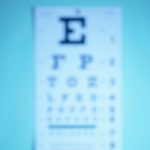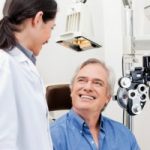Everybody is talking about February being Heart Month, but aside from matters of the heart, you should know that vitamin D deficiency and smoking are important risk factors for macular degeneration – as February is also Age-Related Macular Degeneration (AMD) Awareness Month. AMD is the main cause of vision loss in Americans aged over 65. The condition exists in two forms: wet form, which is less common but curable, and dry form, which is more common, though there’s no cure for it as of yet.
Vitamin D deficiency linked to age related macular degeneration
 Sunlight is more powerful than any drug; it is safe, effective and available free of charge. If it could be trademarked, it would be history’s greatest medical breakthrough. And that’s because sunlight produces vitamin D in the body.
Sunlight is more powerful than any drug; it is safe, effective and available free of charge. If it could be trademarked, it would be history’s greatest medical breakthrough. And that’s because sunlight produces vitamin D in the body.
Advertisement
In the summer months, the human body can synthesize vitamin D when just 10 percent of their total body surface is exposed to ultraviolet rays for 15 to 30 minutes a day.
However, during the winter, when there is a lower solar angle, sun exposure may not be sufficient to maintain vitamin D levels for people who live in the northern half of the U.S. and the whole of Canada. This is when dietary intake may be needed. Continue reading…
Smoking, bad diet and not exercising increase risk of macular degeneration (AMD)
 Age-related macular degeneration (AMD) risk is much higher when a person has a history of heavy smoking, no exercise and bad diet, this according to new findings. Researchers at the University of Wisconsin-Madison were responsible for the new research which was conducted on women. Previous research supports that a healthy diet and exercise can reduce a person’s risk of AMD – a condition associated with worsened vision through aging.
Age-related macular degeneration (AMD) risk is much higher when a person has a history of heavy smoking, no exercise and bad diet, this according to new findings. Researchers at the University of Wisconsin-Madison were responsible for the new research which was conducted on women. Previous research supports that a healthy diet and exercise can reduce a person’s risk of AMD – a condition associated with worsened vision through aging.
The new findings support the idea that genetics work together with smoking, lack of exercise and poor diet to increase a person’s risk of age-related macular degeneration. Julie A. Mares from the university said, “If you have a family history of AMD, the good news is that the study findings suggest that there are things you can do to potentially lower your risk of developing AMD yourself.” Continue reading…
Does age-related macular degeneration impair the ability to use touch screens?
 As the world around us becomes more tech-savvy, a switch to touch screens has been taking place for just about every major device. The question then arises: Does having age-related macular degeneration (AMD) affect a person’s ability to use a touch screen?
As the world around us becomes more tech-savvy, a switch to touch screens has been taking place for just about every major device. The question then arises: Does having age-related macular degeneration (AMD) affect a person’s ability to use a touch screen?
Researchers found that seniors with central vision loss due to age-related macular degeneration can still operate touch-screen devices but their abilities are slower. The research offers a way for those with AMD to better handle touch screen devices.
Age-related macular degeneration is the leading cause of vision loss, and can impact everyday tasks like driving, reading and daily chores. Editor-in-chief of Optometry and Vision Science, Anthony Adams, Ph.D., said, “The advent of digital displays and use of computer screens has opened up many new possibilities for reading activities and travel aids for AMD sufferers.” Continue reading…
Age-related macular degeneration stopped by carotenoids in carrots
 Age-related macular degeneration, a condition that affects the eyes, can be stopped by carotenoids found in carrots. By now you have probably heard carrots are good for your eyes, but new findings really show that they can go a long way to stop age-related macular degeneration. Age-related macular degeneration (AMD) is a condition that occurs over time. It can cause central blurry vision and requires the use of glasses as a form of vision correction.
Age-related macular degeneration, a condition that affects the eyes, can be stopped by carotenoids found in carrots. By now you have probably heard carrots are good for your eyes, but new findings really show that they can go a long way to stop age-related macular degeneration. Age-related macular degeneration (AMD) is a condition that occurs over time. It can cause central blurry vision and requires the use of glasses as a form of vision correction.
Carotenoids are found in carrots and are what is responsible for their orange color. Carotenoids are also found in kale, sweet potatoes, orange peppers and broccoli. Dr. Paul Bernstein from the University of Utah School of Medicine said, “I tell my patients that fruit and vegetable consumption are very important for eye health – this study validates that notion.”
Genetics, environment, and nutrition have all been found to contribute to AMD. Continue reading…
Large gene study boosts macular degeneration (AMD) research
Advertisement
 Age-related macular degeneration (AMD) research received a boost from a large gene study, which could help better understand the genetics involved in this progressive vision disorder. The findings came from the International AMD Genomics Consortium, where researchers collected data from 43,566 individuals and found 52 common and rare variants linked to AMD. Co-senior author Jonathan L. Haines, Ph.D., said, “These variants provide a foundation for genetic studies of AMD going forward.”
Age-related macular degeneration (AMD) research received a boost from a large gene study, which could help better understand the genetics involved in this progressive vision disorder. The findings came from the International AMD Genomics Consortium, where researchers collected data from 43,566 individuals and found 52 common and rare variants linked to AMD. Co-senior author Jonathan L. Haines, Ph.D., said, “These variants provide a foundation for genetic studies of AMD going forward.”
The researchers suggest that the findings could help improve and understand the biology of AMD, which could lead to better treatments for the disease.
The FDA currently does not have approved treatments for a common type of AMD, known as geographic atrophy, or dry AMD. There are, however, approved treatments for neovascular AMD, or wet AMD, but these are not cures and are not successful in all patients. Continue reading…
